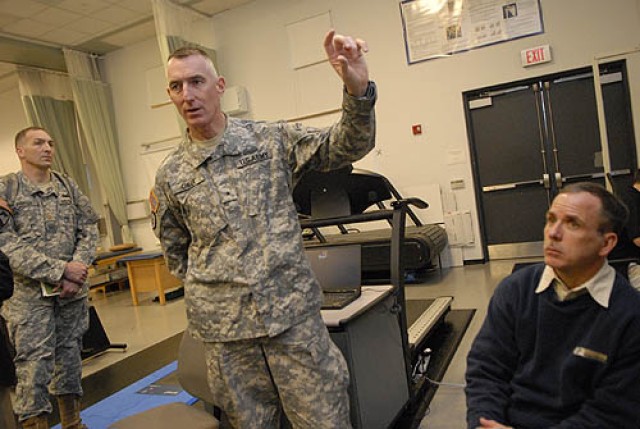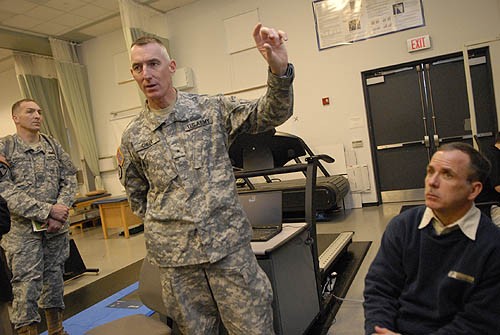The Army is considering partnering with the University of Pittsburgh to improve the quality of life of injured soldiers.
Brig. Gen. Gary Cheek, who heads the Army's Warrior Care and Transition Program, was in Pittsburgh on Friday to meet with professors and doctors from Pitt's School of Health and Rehabilitation Services, and from UPMC's Neuromuscular Research Laboratories.
The purpose of the Warrior Care program is to speed the return of injured soldiers to active service, or -- if their injuries are too severe to return to duty or they do not wish to remain in the military -- to prepare them for rewarding careers in civilian life.
The Warrior Care program was begun after the Washington Post did a Pulitzer prize-winning series of articles in 2007 on conditions for wounded soldiers at Walter Reed Army Medical Center in Washington, D.C., the Army's premiere hospital. The new program has resulted in a substantial increase in morale, said a report from the Association of the U.S. Army (not a part of the Army) last fall.
"Soldier satisfaction has increased from the 60-percent range in July 2007 to approximately 80 percent in one year," the AUSA report said.
There are more than 11,000 soldiers in Warrior Transition Units at Army hospitals and bases throughout the country, but only about 12 percent (1,350) suffered wounds in combat.
Brig. Gen. Cheek came to Pittsburgh in search of ways to boost the satisfaction figure to closer to 100 percent.
"UPMC is at the cutting edge of intellectual thinking about how to return injured people to productive roles in society," he said.
The visit was coordinated by Rory Cooper, director of the Human Engineering Research Laboratories at Pitt, and a decorated U.S. Army veteran who uses a wheelchair as a result of the injuries he suffered during his military service. Dr. Cooper is one of the world's foremost authorities on wheelchair design.
Dr. Cooper's example as well as the knowledge and expertise of the research labs will be helpful to the Warrior Care program, Brig. Gen. Cheek said.
"Rory is a role model for anyone who has suffered a serious injury," the general said.
"I hope very much we'll be able to get a community-based Warrior Transition Unit here," Dr. Cooper said. "Pittsburgh has so much to offer."
Brig. Gen. Cheek also toured the Neuromuscular Research Laboratories at UPMC's Center for Sports Medicine. The labs, under the direction of Dr. Scott Lephart, already are doing pioneering work with the Army's 101st Airborne Division (Air Assault) and the Navy's SEALs to improve fitness and reduce injuries in training. His team's techniques can be adapted to help injured soldiers recover faster and more fully, Dr. Lephart said.
Jack Kelly can be reached at jkelly@post-gazette.com or 412-263-1476.
First published on January 14, 2009 at 12:00 am


Social Sharing